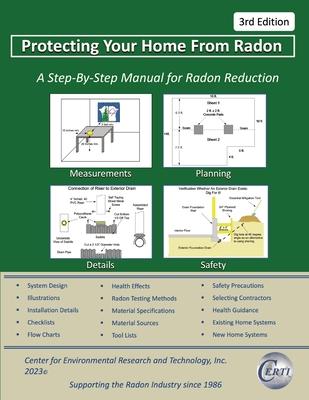At last! A book that answers homeowners' typical questions and walks them through the process of reducing the nation's number one environmental health hazard: RADON.
Radon is recognized as a Class A Carcinogen by the US Surgeon General, but can be reduced in any home to within US EPA guidance levels; this book clearly explains how it can be done. The same proven methods used by professional mitigators are detailed in this easy-to-understand manual. Protecting Your Home From Radon (3rd Edition) is now in its third printing cycle. The first edition of this book was written in 1993, to assist what was thought to be an occasional do-it-yourself homeowner. In reality, the number of individuals wanting to reduce radon levels themselves was much higher than anticipated. In addition, the manual was being utilized to better understand the radon mitigation process prior to hiring a contractor, and to design systems installed into homes during construction. The overwhelming success of the book led to the distribution of several thousand copies to individuals and libraries. Its popularity identified the need to address the process of hiring contractors and installing passive and active systems in new home construction. The third edition is now readily available in e-book or soft-cover formats.
This detailed manual describes the most common methods for reliably reducing radon in a home. Written in a non-technical format, the book includes step-by-step instructions and illustrations to guide homeowners through the radon mitigation process:
Chapter 1: Health Effects, Chapter 2: Measurements, Chapter 3: Radon Entry, Chapter 4: Crawl Space Systems, Chapter 5: Drainage Based Systems - How existing sumps and drain tiles can be modified for cost-effective radon reduction. Chapter 6: Sub-Slab Systems - How sub-slab depressurization systems are designed and installed in basement, slab-on-grade. Chapter 7: Piping Systems, Chapter 8: Caulking and Sealing, Chapter 9: Combining Approaches, Chapter 10: Safety - An in-depth discussion of safe installation practices, including personal protective gear and area ventilation. The need to check for back-drafting and post-mitigation radon testing is emphasized. Chapter 11: New Home Systems - How to install cost-effective radon control systems during new home construction. Chapter 12: Selecting a Contractor - For people who want to make an educated decision about hiring a contractor to perform all or part of a mitigation system. Whether you are a homeowner exploring how to install your own radon reduction system, a home builder who may be installing passive or active radon systems, an HVAC, electrical or plumbing professional, or a radon professional, this manual will benefit you and your clients over and over again.
